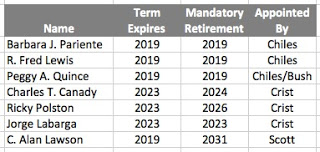The Florida League of Women Voters and Common Cause are suing Governor Rick Scott in the state Supreme Court to stop ”midnight appointments” of three justices to that Court. The suit was filed last month, following Scott’s statement in December that “I’ll appoint three … justices the morning I finish my term.”
He was referring to the fact that three of Florida’s seven Supreme Court justices — R. Fred Lewis, Barbara Pariente and Peggy Quince — face mandatory retirement on January 8, 2019, which will be Scott’s last day as governor.
An important constitutional question
The civic groups want “final resolution” of a constitutional question that “has plagued the State for decades”: Who gets to appoint the new judge or justice when a seat opens on a Florida appellate court due to an expired term coinciding with the election of a new governor: the outgoing governor or the newly elected governor?
“The biggest impact any president can have on American society and on the American economy is who’s on [the Supreme Court],” former House Speaker John Boehner said. The same can be said about the impact of a governor at the state level.
In their petition, the groups warn that:
The importance of deciding this issue before Governor Scott attempts to make the subject appointments cannot be overstated. Not only would that invite a constitutional crisis, especially if his successor makes different appointments, but it would disrupt the functioning of this Court and any district court on which a similar vacancy might arise….
They urge the Supreme Court to hear the case itself, and not send it to the lower courts to decide. Although the 2018 election is “over a year away, there is simply not time” for the case to wind its way through the court system to reach final resolution.
Some history
Three decades ago, two Florida Supreme Court Justices faced mandatory retirement when their terms expired January 6, 1987. Then outgoing Governor Democrat Bob Graham announced that he would leave office on January 3, 1987, a few days before the end of this term, to be sworn in to the U.S. Senate.
According to a news piece at the time:
“Whether Graham or Gov.-elect Bob Martinez will appoint the new justices depends on whether the justices retire before Graham leaves office…. If [they retire] in December, Graham could appoint their successors, and the justices would receive about $3,500 in retirement benefits for January. But if they wait until Jan. 6 to retire, they will lose that month’s benefits and Martinez will make the appointments.
It was reported later that, after consulting with one of his lawyers, Graham decided not to attempt to fill the positions himself in the weeks before he left office. Both justices stayed on through January 6, and incoming governor Martinez, a Republican, appointed their replacements.
A similar situation arose four years later. Governor Martinez had been defeated for reelection by Democrat Lawton Chiles, and one Florida Supreme Court Justice had reached mandatory retirement age. From a piece at the time:
Both Bob Martinez and Lawton Chiles think they should decide who fills a vacancy on the state Supreme Court that will occur just hours before Chiles replaces Martinez as governor. … Chiles said he thought he should make the appointment, citing the fact that four years ago Martinez, then an incoming governor, made two appointments to the bench.
Avoiding a confrontation with his successor, Martinez informed Chiles by letter that “My deep respect for the institution of the office of governor and for the precedent established by Gov. Bob Graham has led me to the determination that I will not name a successor ….”
Eight years later, both outgoing governor Chiles and incoming governor Jeb Bush, a Republican, wanted to replace a retiring justice whose last day in office would be Bush’s first.
In what was referred to as “an unusual act of job sharing,” Chiles and Bush agreed to separately interview four finalists and then see if they could agree. It was understood that whoever they picked could sway the court’s opinion on everything from property rights and abortion to the death penalty. “Both Gov. Chiles and Bush want this to be a very smooth transition and this is one way it could be,” a spokesperson said at the time. They jointly named Peggy Quince, a Democrat.
All three justices Scott said he plans to replace were appointed by Democrat Chiles. The four who will remain in office were appointed by Republicans.
Current Justices of the Florida Supreme Court
More recent history
In 2014, Amendment 3 – Prospective Judicial Vacancies came before Florida voters. Put forward by the Republican-controlled legislature, it would have allowed the governor to “prospectively” fill a vacancy, meaning that the governor would have not needed to wait until a judge completes his or her term to pick a successor in situations where a judge reaches the mandatory judicial retirement age of 70, fails to qualify for a retention election, or fails to be retained through election.
Opposing Amendment 3 in a October 2014 editorial titled Reject Partisan Politics in Judiciary, former Florida Supreme Court Justice Harry Lee Anstead wrote:
The three anticipated Supreme Court vacancies specifically targeted by the amendment occur in four years and at the same time the term of an outgoing governor expires. Of course, appointments cannot be made until a position is vacant, hence the authority to appoint a replacement will belong to an incoming governor, and not the governor whose term has ended….
The scheme proposed in Amendment 3 gives a departing governor the power to tip the scales of justice for partisan reasons on the way out the door — with impunity. And, therein lies the easily identified real intent of this amendment. Partisan advocates, frustrated by the public’s rejection of their effort to remove these same three Florida justices in their retention elections in 2012, have audaciously found a new scheme to achieve their goals of stacking the court politically.
It is a one-time gamble and a shortsighted strategy on multiple levels. First, it presumes Gov. Rick Scott is re-elected so he can make the appointments at the end of his second term. More importantly it cynically ignores the possibility that an informed Florida public will reject this blatant bid to politicize the judiciary. Floridians across the political spectrum have consistently agreed … on the importance of keeping partisan politics out of our courts. Voters have a chance to send that important message again this November, by voting NO on Amendment 3.
Amendment 3 failed, gaining just 48 percent voter approval, well short of the 60 percent needed to become law.
Now we have context
We now have context for Gov. Scott’s statement last December that he would appoint three more justices the morning of his last day in office. In the words of a recent Palm Beach Post Editorial:
This opportunity to flout the will of the voters is nothing more than a power grab. Actually, this could be the power grab to end all power grabs, as the last bastion of true partisan independence in state government would certainly be less so.
The need for the League of Women Voters/Common Cause lawsuit is clear. And as they argue in their petition, it should be decided quickly to clarify for voters and potential candidates what’s at stake in the 2018 gubernatorial election. Will the to-be-elected governor choose the next three Supreme Court justices, or will Rick Scott?
The Governor’s response
Politics in the judicial branch
Political influences are a constant challenge to the independence of the courts and their ability to act as a check and balance, according to a report by the Florida Access to Justice Project. It’s worth reading.
For example, a bill (HJR 121) was introduced in the most recent legislative session that would have put a constitutional amendment on the 2018 ballot to allow the Legislature to override state court decisions with a two-thirds vote. Fortunately, it died in committee.
What’s next?
The case is now before the three justices who are leaving and their four colleagues. They must decide who gets to name the successors.
Governor Scott should “acknowledge that the current Supreme Court can be trusted to render a fair decision,” says a Daytona Beach News-Journal editorial:
With four justices appointed by Republicans (including Scott’s well-received recent pick, Justice Alan Lawson) and three by Democrats, the court is balanced, and justices have shown a pattern of open, thoughtful deliberation and unanimity that should bolster the confidence of the governor — and Floridians….
The governor should support the League of Women Voters’ call for a swift resolution, make his best case to the Supreme Court — then abide by its decision.
Hopefully that’s what will happen — and soon, before the 2018 governor’s race really gets underway and the issue becomes even more political.
I appreciate the Florida League of Women Voters and Common Cause for taking up this important fight. For more information and to support them, visit thefloridavoter.org and fl.commoncause.org.


